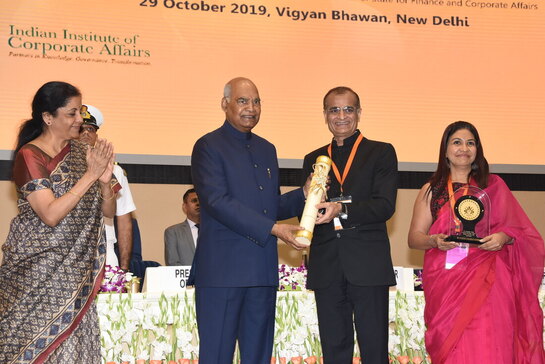|
EdelGive Foundation
An Edelweiss Initiative Founder - Edelweiss Group Country of Origin - India Countries of Operation - India Sector of Activity - Gender Justice, Poverty Alleviation |
"Hope to me means faith. It means infinite empathy and generosity. It means the ability to listen, to feel and to act." Vidya Shah, Chairperson & CEO, EdelGive Foundation
|
Executive summary
 Rashesh Shah and Vidya Shah receive the National CSR Award 2019 from the President of India for the work done by EdelGive Foundation
Rashesh Shah and Vidya Shah receive the National CSR Award 2019 from the President of India for the work done by EdelGive Foundation
EdelGive Foundation, set up in 2008, is the philanthropic arm of the Edelweiss Group. Through the last decade, EdelGive has primarily been a grant-making organization supporting small and mid-sized NGOs across India. Additionally, it has become a connecting platform between grant makers/donors and credible NGOs across the country. Its endeavor is to build sustainable institutions and organizations that promote societal growth and innovation and advance the common good by bringing the skills, resources and talents of for-profit business to the not-for-profit world.
Logically, collaboration across sectors and with groups having complementary skills and resources can help build and scale sustainable models to address perennial societal issues. However, few philanthropists or other actors collaborate when aiming to confront some of the most challenging issues of our times. This is how EdelGive Foundation differentiates itself from its peers. EdelGive Foundation has worked to build collaborative philanthropic ecosystems and platforms for collective action to produce long-term, sustainable and holistic impact.
The case draws upon giving trends and traditions in pre- and post-partition India. Philanthropy in India has deep historical, cultural and religious roots; pre-partition India saw the emergence of wealthy families as a result of industrialization. In fact, philanthropy had played a key role in strengthening the independence movement in India. From industrialization in pre-partition India to post-partition nation building, the case looks at the birth of Edelweiss group as a result of India`s economic liberalization in the 1990s. The successful business group created its CSR arm – EdelGive Foundation – which has benefitted hundreds of thousands of people directly and indirectly by building the capacity of non-governmental organizations. The case highlights EdelGive`s journey over the years.
Key Takeaways
Logically, collaboration across sectors and with groups having complementary skills and resources can help build and scale sustainable models to address perennial societal issues. However, few philanthropists or other actors collaborate when aiming to confront some of the most challenging issues of our times. This is how EdelGive Foundation differentiates itself from its peers. EdelGive Foundation has worked to build collaborative philanthropic ecosystems and platforms for collective action to produce long-term, sustainable and holistic impact.
The case draws upon giving trends and traditions in pre- and post-partition India. Philanthropy in India has deep historical, cultural and religious roots; pre-partition India saw the emergence of wealthy families as a result of industrialization. In fact, philanthropy had played a key role in strengthening the independence movement in India. From industrialization in pre-partition India to post-partition nation building, the case looks at the birth of Edelweiss group as a result of India`s economic liberalization in the 1990s. The successful business group created its CSR arm – EdelGive Foundation – which has benefitted hundreds of thousands of people directly and indirectly by building the capacity of non-governmental organizations. The case highlights EdelGive`s journey over the years.
Key Takeaways
- Sustainable and long-term change can only occur by working with the system to enable the system.
- Social transformation and development require substantial investment in people and skills.
- Within the philanthropic ecosystem, not all stakeholders and shareholders have equal opportunities and resources. An equitable approach to partnership is needed.
- Change comes through building grassroots leadership and capacity in non-profit organizations.
- Collaboration across sectors leads to deeper impact and multiplies outcomes. Partnerships between government, private donors, the corporate sector and NGOs can bring about systemic change.
- Philanthropy should not happen in isolation. It should be an equal partner in human development as opposed to a player on the periphery.
- Business and philanthropy must intersect and work together to achieve success.









